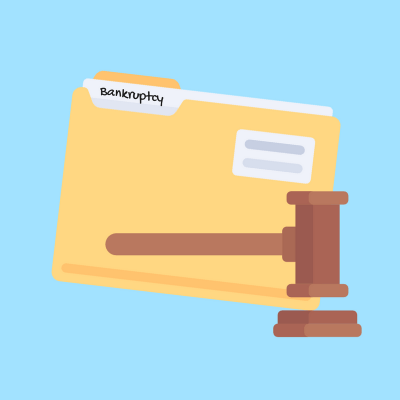- Lemberg Law
- Bankruptcy Law: Terms And Definitions
- FAQ About Bankruptcy
- What Happens When You File for Bankruptcy?
Once you’ve filed court papers that detail your outstanding debt and your income and assets, you’ll receive an automatic stay that protects you from creditors and debt collectors.

What is an Automatic Stay and How Does it Help Me?
Once you’ve filed for bankruptcy, the court will grant what’s called an “automatic stay.” This means that, once they’ve been notified that you’ve filed for bankruptcy, debt collectors will stop calling and creditors cannot get court judgments against you. Your cell phone service, electricity, or gas won’t be turned off for at least three weeks. Your bank can’t start foreclosure proceedings on your house or your landlord can’t evict you if the landlord doesn’t already have a judgment against you. If your wages are being garnished, then the automatic stay puts the garnishment on hold. In other words, you’ll get some breathing room. An automatic stay is designed to allow you to move through the bankruptcy process without being hounded by creditors.
An automatic stay isn’t watertight, however. You’re still subject to child support lawsuits, demands for back tax payments, and criminal penalties that don’t involve financial restitution or fines. In addition, creditors can try to convince a court to life the automatic stay. This sometimes happens for evictions, foreclosures, and car repossessions.
What is a Meeting of Creditors?
After you petition for bankruptcy, you’ll attend a meeting of creditors, which is also known as a 341 hearing. Your creditors don’t actually show up (although they can if they wish to); rather, you’ll have a short hearing with your bankruptcy trustee. The trustee is responsible for overseeing your case and distributing your assets to your creditors. As such, the trustee wants to confirm that you’ve revealed all of your income and assets.
During the hearing, you’ll answer questions under oath and will likely be asked about your property, legal claims you might have against individuals or businesses, payments you may have made to people you know, debts that other people may owe you, and so forth. You should be prepared with documentation to substantiate the information you included in your bankruptcy filing.
What Happens During a Bankruptcy Discharge?
Discharging your debt is the goal of your bankruptcy proceeding. If you are filing under Chapter 7, then all of your qualifying debts will be wiped out and you’ll have a clean slate (though the bankruptcy will remain on your credit report). If you are filing under Chapter 13, then the discharge will happen once you have completed your repayment plan.
The discharge letter will be mailed to all of your qualifying creditors. At that point, they are no longer allowed to try and collect on that debt. If a third-party debt collector does try and collect on a debt discharged in bankruptcy, then they are in violation of the Fair Debt Collection Practices Act.
Have questions? Call us now at 855-301-2100 for a Free Case Evaluation.
Our services are absolutely FREE to you.
The harassing company pays our fees.